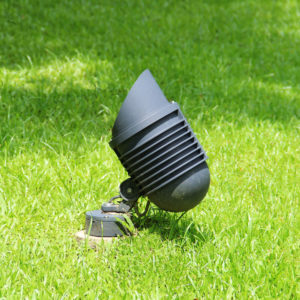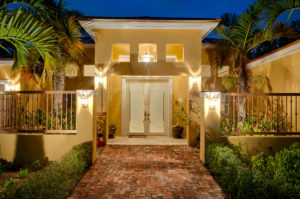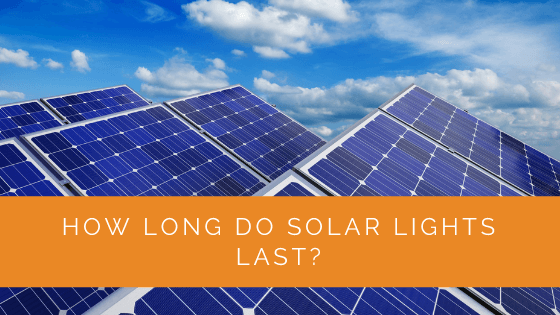Times are changing, and homeowners are actively embracing solar energy as their primary source of electricity. Today, most people want to equip their homes with renewable and affordable energy sources. As a result, the sale of solar lights is gaining momentum.
Though solar lights are costly fixtures, they are worth every penny. However, their high price makes buyers wonder about their longevity and lifespan.
Do solar lights offer a lifespan that is worth their price tag? Will the solar lights shine bright forever?
If these questions bother you, you’ve come to the right place. We will discuss the longevity of solar lights and how you can take better care of them.
Contents
- 1 Key Takeaways
- 2 Can Solar Lights Last Forever?
- 3 How Long Do Solar Lights Last?
- 4 How Can I Improve the Lifespan of Solar Lights?
- 5 Case Study: Extending the Lifespan of Solar Lights for a Homeowner
- 6 Expert Insights From Our Solar Panel Installers About How Long Solar Lights Last
- 7 Our Expertise in Solar Lights
- 8 Summary
Key Takeaways
- Solar lights have a finite lifespan, with batteries lasting around three to four years and LEDs up to ten years, making them a durable and long-lasting lighting option.
- Maintaining solar lights is crucial for their longevity, involving regular cleaning, positioning in areas with direct sunlight, keeping spare batteries, and using an override switch during adverse weather conditions.
- Solar lights offer cost-effective and energy-efficient lighting, making them a worthwhile investment for homeowners looking to reduce electricity bills and embrace renewable energy sources.
Can Solar Lights Last Forever?
Even the highest quality materials don’t last forever. No matter how glorious these solar lights look, they do have an expiry date. So, how long can solar lights last?
The batteries in the solar lights will give you three to four years of service. On the other hand, the LEDs in your solar lights can run for as long as ten years before requiring replacement.
A long shelf life ensures that you don’t have to face replacement hassles for years. Even so, replacing the batteries of your solar lights is relatively straightforward.
With LEDs in your solar lights, you can stay assured of a decade without worrying about a replacement. The lifespan of LEDs and batteries gives solar lights an edge over other power sources.
Solar lights are also useful because you can leave them lit all night long. They can illuminate your outdoor spaces if they receive strong sunshine throughout the day.
However, you need to maintain them well if you want these lights to serve you as expected.

How Long Do Solar Lights Last?
In the previous section, we gave you a generalized idea of the lifespan of a solar light. But, several other factors determine the longevity of your solar lights.
Different components of your solar lights might need replacement from time to time. These complex devices have several parts that affect their lifespan, lighting, and power. Here’s everything you need to know about solar lights.
How Long Do Solar Lighting Batteries Last?
Most commonly, solar-powered lights use a rechargeable battery. The panels absorb sunlight and convert it into consumable energy. They then transfer this converted energy to a battery unit and fuel the LED lights.
These batteries have a lifespan of nearly four years. But, the lasting of your battery will also depend on its maintenance and other components.
We advise you to stock some rechargeable batteries beforehand for a hassle-free replacement. The lasting of the batteries will also depend on your consumption frequency.
How Long Do Solar Lighting Panels Last?
Solar panels play the role of charging the batteries in the setup and do not directly power the lights. Nevertheless, maintaining solar panels is equally essential.
Damaged solar panels will dramatically alter the lifespan of your solar panels. It would help if you cleaned these panels often. Make sure that the panels receive direct sunlight. Also, the panel should be free of any obstructions.
Unobstructed panels absorb sunlight better and do an excellent job of charging the batteries of solar lights.
How Long Do Light Sensors Last?
Another critical factor that determines the overall lifespan of your solar lights is the light sensors. Most people overlook the condition of the solar light sensor. It is responsible for detecting the surrounding light levels.
If the sensors detect substantial sunlight, they will automatically stop illuminating the LED lights. Due to obstruction, the sensor might not be able to detect light. As a result, it’ll keep the light switched on all day long.
Such situations will end up draining your battery unnecessarily. Further, this can significantly reduce the overall lifespan of your solar lights.
How Long Does the Casing Last?
The quality of the casing can save your solar lights from deterioration. The plastic or glass casing of the solar lights is the most durable and versatile part of its structure.
Without proper and durable casing, it’ll be easy for the dust and debris to infiltrate and hamper the performance of your solar lights. Therefore, keeping the casing of your solar lights clean and damage-free is the way to go.
How Long Do LEDs Last?
You’ll notice that most solar lights these days use LEDs. Why? It is because LEDs have a long-lasting and much more effective performance. These lights are more cost-effective and energy-efficient.
LEDs last at least ten years before requiring a replacement. In some cases, they might even serve you for as long as 30 years.
So, if the LEDs are not damaged or cracked, it would not hamper the longevity of your solar lights.
How Can I Improve the Lifespan of Solar Lights?
Now that you know the lifespan of different components of solar lights, it’s time to look at them as a whole.
There are a couple of secrets that can help you prolong the life of your beautiful solar lights. Handling them irresponsibly and not maintaining them will only shorten their lifespan.
Harsh weather and outdoor conditions can take a toll on your solar lights. Though no solar lights last indefinitely, proper care can boost their lifespan.
So, if you’re wondering about tricks that can notch up your lights’ performance, we have some for you!
Keep a Stock of Replacement Batteries
By now, you must have understood that batteries are an indispensable part of solar lights. These rechargeable batteries power themselves using direct sunlight.
Though these batteries never run out of power, they might degrade over time. Harsh weather conditions also take a toll on their durability.
Eventually, the batteries will diminish in their capacity to take and store power. When the batteries degrade, they become unreliable and malfunction. Therefore, we advise you to keep a spare set of batteries for your solar lights.
Though the batteries have a lifespan of up to four years, changing them every couple of years is recommended.

Clean Them Regularly
Cleaning always has benefits for electrical devices. The dirt and debris accumulating on your solar lights can alter the lifespan of your solar lights. Outdoor solar lights require more care and maintenance as the weather can be harsh on them.
Cleaning and maintaining them will help the lights to function properly. Try to clean the lights at least once a month.
Besides, solar lights cannot perform well with the layer of dirt on them. For instance, the dirt and debris on solar panels might obstruct solar panels from receiving sunlight.
Position Them Away From Clutter
The placement of your solar lights is another factor that affects their lifespan. Do you know that your solar light might last longer if they have access to direct sunlight?
Placing the solar lights near the house or the hedges and fence is one of the most unfortunate mistakes. Though it might encourage aesthetics, it can cost you.
Placing the solar lights near structures or your house prevents access to direct sunlight. The structures cast a shadow that might not be an ideal charging condition for solar lights.
Carefully analyze your outdoor area before placing your solar lights. Once you note the shadow-free and open spaces, you can go ahead and fix your lights.
Use Override Switch
If you have recently bought a solar light, the chances are that it has an override switch. Most modern-day solar lights include an override switch. It is essentially a power switch that overrides the light sensor.
If you want to improve the lifespan of your LEDs and lights, use this switch during rain or overcast weather.
During the winter or poor weather conditions, the solar lights might not perform well due to insufficient sunlight. Therefore, you can preserve power by manually turning off the lights.
Snow and rain are the most unfavorable seasons for batteries. Hence, this tip can save your lights from significant damages.
Case Study: Extending the Lifespan of Solar Lights for a Homeowner
Background
At Solar Panels Network USA, we frequently assist clients in troubleshooting and fixing their solar lights to restore optimal functionality. This case study highlights our approach to resolving issues for a homeowner whose solar lights had stopped working effectively.
Project Overview
A residential client contacted us with concerns about their solar lights, which had ceased to function properly. Our objective was to diagnose the problem and implement effective solutions to get the lights working again and extend their lifespan.
Implementation
Initial Assessment
We began with a thorough assessment to identify potential issues, focusing on:
- Sunlight exposure
- Battery condition
- Panel cleanliness
- Sensor functionality
Step-by-Step Fixes
- Avoiding Shades: We discovered that several solar lights were positioned under the shade of trees and structures. We recommended relocating these lights to areas with unobstructed sunlight, ensuring the solar panels could absorb maximum sunlight for effective charging.
- Replacing the Batteries: We checked the batteries and found them to be old and losing their charging capacity. We replaced them with high-quality NiMH batteries, known for their durability and long lifespan. During the replacement, we ensured there was no acid leakage or damage in the battery compartments.
- Fixing the Sensor: Some lights had faulty sensors, preventing them from functioning correctly. We tested the sensors by covering them to simulate darkness. Faulty sensors were replaced, restoring the lights’ ability to automatically turn on at dusk and off at dawn.
- Checking for Water Build-Up: We found moisture buildup in a few lights, which affected their performance. We disassembled the lights, dried all components thoroughly, and reassembled them, ensuring the batteries were correctly placed. We also replaced any worn-out sealants to prevent future moisture intrusion.
- Removing Dirt and Debris: The solar panels had accumulated dirt and grime, reducing their efficiency. We cleaned the panels with a damp cloth, improving their ability to absorb sunlight. We advised the client to clean the panels regularly to maintain optimal performance.
- Inspecting Plugging and Connections: We ensured all cables were securely plugged in and that waterproof connectors were tightly sealed. Loose connections can hinder the lights’ ability to charge and function correctly. Secure connections resolved this issue.
- Examining Nearby Light Sources: Artificial light sources, such as streetlights, were interfering with the solar panels’ sensors. We repositioned the solar lights away from these sources to ensure they functioned without external interference.
Results
By following these steps, we restored the client’s solar lights to full functionality. The lights provided consistent and reliable illumination, enhancing the property’s safety and aesthetic appeal. The client was pleased with the improvements and appreciated the guidance on regular maintenance.
Summary
This case study demonstrates the effectiveness of a systematic approach to fixing solar lights. By addressing common issues such as insufficient sunlight exposure, battery replacement, sensor functionality, and cleanliness, we successfully restored the client’s solar lights. Regular maintenance and proper placement are key to ensuring the efficiency and longevity of solar lighting solutions. At Solar Panels Network USA, we are committed to helping our clients achieve the best results with their solar lighting through expert advice and support.
Expert Insights From Our Solar Panel Installers About How Long Solar Lights Last
Solar lights are incredibly durable, with their LED components lasting up to 10 years. Regular maintenance, like cleaning the panels, can significantly extend their lifespan.
Senior Solar Technician
Replacing the batteries every few years ensures your solar lights remain efficient. High-quality NiMH or Li-ion batteries are ideal for longevity and reliability.
Lead Solar Installer
Proper placement is key. Ensure your solar lights are positioned to receive direct sunlight for optimal performance and longevity.
Solar Installation Specialist
Our Expertise in Solar Lights
At Solar Panels Network USA, we’re here to provide you with valuable information and support regarding solar lighting. With our experience and understanding of the solar lighting industry, our team of experts is prepared to assist you in finding the right lighting solution for your needs. Whether you’re interested in improving your outdoor spaces, conserving energy, or adopting a more sustainable approach, we’re well-equipped to help. Please feel free to contact us with any questions or inquiries.
Summary
Solar lights offer overwhelming services to every home. Their excellent mechanism ensures to keep the electricity bills at bay. Though the up-front costs of solar lights are relatively high, their long lifespan pays off for it.
The lasting of your solar lights will largely depend upon how well you maintain them. You can follow the tips listed in this article to ensure the healthy condition of your solar lights.
Hopefully, this article has addressed all your doubts on how long solar lights last.
Now, since you know that these beautiful lights will shine bright for years to come, what’s the wait for? Hurry up and light your homes with solar lights!
About the Author
Solar Panels Network USA stands at the forefront of solar energy solutions, driven by a team of seasoned solar engineers and energy consultants. With over decades of experience in delivering high-quality solar installations and maintenance, we are committed to promoting sustainable energy through customer-centric, tailored solutions. Our articles reflect this commitment, crafted collaboratively by experts to provide accurate, up-to-date insights into solar technology, ensuring our readers are well-informed and empowered in their solar energy decisions.

